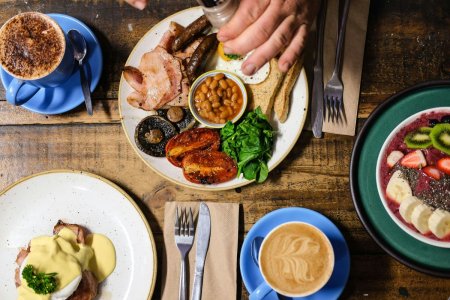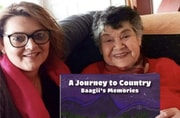Scientists reveal shocking link between popular breakfast vitamin and heart attacks
- Replies 9
Disclaimer: This article is not intended as medical advice. It is advisable for readers to consult their healthcare professionals for a proper diagnosis.
Breakfast is often hailed as the most important meal of the day, setting the tone for our energy levels and productivity.
From hearty morning staples like bread and pasta to convenient options like breakfast cereals, the choices are as diverse as they are essential.
However, in a groundbreaking study, researchers found that these favourites might be hiding a silent threat to your heart health.
Niacin, a common B vitamin, is added to ‘enriched’ or 'fortified' breakfast items to lower cholesterol.
However, a recent study led by Dr Stanley Hazen of the Cleveland Clinic in the US, found that a chemical called 4PY, formed as a result of the body metabolising surplus niacin, could be a significant driver of heart attacks, strokes, and other cardiac conditions.
'The main takeaway is not that we should cut out our entire intake of niacin [but] a discussion over whether a continued mandate of flour and cereal fortification with niacin could be warranted,' Dr Hazen said.

While niacin deficiency can cause a potentially lethal condition called pellagra, characterised by inflamed skin, mouth sores, diarrhoea, and even dementia, an excess of niacin can also have serious health implications.
The study, published in Nature Medicine, found that one in four individuals was getting too much niacin and had high levels of 4PY in their blood.
Dr Hazen explained, ‘Niacin's effects have always been somewhat of a paradox.’
'Despite lowering cholesterol, the clinical benefits have always been less than anticipated. This led to the idea that excess niacin caused unclear adverse effects that partially counteracted the benefits of cholesterol-lowering. We believe our findings help explain this paradox.’
‘This illustrates why investigating residual cardiovascular risk is so critical; we learn so much more than what we set out to find,’ he added.
So, what does this mean for your breakfast routine? It's not about completely eliminating niacin from your diet, but rather being aware of your intake.
The National Health and Medical Research Council (NHMRC) recommends a daily allowance of 16mg of niacin for men and 14mg for women.
It's also important to remember that everyone's tolerance for niacin is slightly different.
Dr Hazen likened niacin intake to multiple taps pouring water into a bucket.
When the bucket reaches capacity, it starts overflowing.
Subsequently, the body must metabolise the overflow and generate other byproducts, such as 4PY.
Additional niacin can be excreted through urine. Severe overdoses may also result in flushing and liver impairment.
Dr Hazen stated that determining the precise amount of niacin deemed ‘too much’ for individuals is challenging.
However, he proposed the potential development of a home blood test to notify individuals with elevated 4PY levels.
He said, ‘Niacin deficiency is very rare today because the base of our food pyramid is filled with products that are fortified, whether it be flour, cereal, grains, rice or soy.’
‘Those with high levels of 4PY should cut back on the carbs and eat more protein and whole foods—more of a Mediterranean style diet,’ he recommended.
Dr Hazen mentioned that in the past, high doses of niacin were prescribed to individuals with elevated cholesterol levels, saying, ‘Even though it lowered cholesterol, it didn’t lower the risk of heart attack or stroke. It raised the question, what else was niacin doing that counteracted the benefits? We think we have found the answer here.’
While more research is needed to fully understand the implications of these findings, it's clear that a better understanding of niacin and its effects on the body is crucial for maintaining heart health.
Aside from heart disease, one of the leading causes of death among Australians is cancer. Because of this, cancer myths have been readily believed by many without checking their legitimacy. You can read more about them here.

What are your thoughts on these findings? Have you been aware of the amount of niacin in your diet? Share your thoughts in the comments below.
Breakfast is often hailed as the most important meal of the day, setting the tone for our energy levels and productivity.
From hearty morning staples like bread and pasta to convenient options like breakfast cereals, the choices are as diverse as they are essential.
However, in a groundbreaking study, researchers found that these favourites might be hiding a silent threat to your heart health.
Niacin, a common B vitamin, is added to ‘enriched’ or 'fortified' breakfast items to lower cholesterol.
However, a recent study led by Dr Stanley Hazen of the Cleveland Clinic in the US, found that a chemical called 4PY, formed as a result of the body metabolising surplus niacin, could be a significant driver of heart attacks, strokes, and other cardiac conditions.
'The main takeaway is not that we should cut out our entire intake of niacin [but] a discussion over whether a continued mandate of flour and cereal fortification with niacin could be warranted,' Dr Hazen said.

Researchers warned about niacin, a common B vitamin, added to breakfast items like bread, cereals, and pasta. Credits: Unsplash
While niacin deficiency can cause a potentially lethal condition called pellagra, characterised by inflamed skin, mouth sores, diarrhoea, and even dementia, an excess of niacin can also have serious health implications.
The study, published in Nature Medicine, found that one in four individuals was getting too much niacin and had high levels of 4PY in their blood.
Dr Hazen explained, ‘Niacin's effects have always been somewhat of a paradox.’
'Despite lowering cholesterol, the clinical benefits have always been less than anticipated. This led to the idea that excess niacin caused unclear adverse effects that partially counteracted the benefits of cholesterol-lowering. We believe our findings help explain this paradox.’
‘This illustrates why investigating residual cardiovascular risk is so critical; we learn so much more than what we set out to find,’ he added.
So, what does this mean for your breakfast routine? It's not about completely eliminating niacin from your diet, but rather being aware of your intake.
The National Health and Medical Research Council (NHMRC) recommends a daily allowance of 16mg of niacin for men and 14mg for women.
It's also important to remember that everyone's tolerance for niacin is slightly different.
Dr Hazen likened niacin intake to multiple taps pouring water into a bucket.
When the bucket reaches capacity, it starts overflowing.
Subsequently, the body must metabolise the overflow and generate other byproducts, such as 4PY.
Additional niacin can be excreted through urine. Severe overdoses may also result in flushing and liver impairment.
Dr Hazen stated that determining the precise amount of niacin deemed ‘too much’ for individuals is challenging.
However, he proposed the potential development of a home blood test to notify individuals with elevated 4PY levels.
He said, ‘Niacin deficiency is very rare today because the base of our food pyramid is filled with products that are fortified, whether it be flour, cereal, grains, rice or soy.’
‘Those with high levels of 4PY should cut back on the carbs and eat more protein and whole foods—more of a Mediterranean style diet,’ he recommended.
Dr Hazen mentioned that in the past, high doses of niacin were prescribed to individuals with elevated cholesterol levels, saying, ‘Even though it lowered cholesterol, it didn’t lower the risk of heart attack or stroke. It raised the question, what else was niacin doing that counteracted the benefits? We think we have found the answer here.’
While more research is needed to fully understand the implications of these findings, it's clear that a better understanding of niacin and its effects on the body is crucial for maintaining heart health.
Aside from heart disease, one of the leading causes of death among Australians is cancer. Because of this, cancer myths have been readily believed by many without checking their legitimacy. You can read more about them here.
Key Takeaways
- Niacin, a common B vitamin added to fortified foods, might be a significant contributor to heart attacks and strokes, according to new research.
- Excess intake of niacin could lead to high levels of a chemical called 4PY in the blood, which is strongly associated with cardiac conditions.
- The National Health and Medical Research Council’s (NHMRC) recommended daily allowance of niacin is 16mg for men and 14mg for women.
- While niacin deficiency is rare due to fortification, researchers suggested monitoring individual tolerance to prevent potential adverse effects on heart health.
What are your thoughts on these findings? Have you been aware of the amount of niacin in your diet? Share your thoughts in the comments below.






